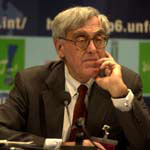Lots of grumbling lately from environmental insiders displeased with the way Frank Loy handled negotiating duties for the U.S. during the fruitless climate change talks at The Hague, Netherlands.
The main complaint: Bad clock management.
Without getting too mired in bad sports metaphors, the knock on Loy, the undersecretary of state for global affairs, is that he failed to get back to his European counterparts in time with the U.S’s final offer to close loopholes in an agreement calling on industrialized nations to reduce greenhouse gas emissions to 5 percent below 1990 levels.
According to highly placed environmentalists who were at The Hague, Loy had more ground to give to European ministers, including possible caps on emission credits trading and on the use of “carbon sinks,” forests and farmland that absorb carbon-dioxide, to count in lieu of emissions reductions.
One top environmental group leader said of Loy, who was formerly chair of the board at the League of Conservation Voters and vice chair of Environmental Defense (before it dropped the Fund): “He seems like a decent man, really. What it looks like is [U.S. negotiators] held their ground on loopholes, particularly on sinks, until it was too late. … They offered all of this great stuff and still had more to give, but by the time they were ready to give it some of the other delegates had gone home. They ran out of time.”
Another environmental group official present at The Hague also praised Loy as person but added, “As a negotiator? I don’t know. The bottom line is they thought they had more time than they actually did.”
Woke Up on the Right Side of the Bed
Criticism of Loy’s clock management aside, few environmentalists were despondent about the overall future of the Kyoto climate change treaty (particularly after getting a couple nights sleep upon returning from the Netherlands).
Even the hostility of a President George W. Bush to ratifying Kyoto didn’t seem to weigh too heavily on many enviros’ minds.
Bush, of course, could basically ignore the global warming talks being prepared for Bonn, Germany, next year in the wake of The Hague collapse. Or he could submit the current language of the Kyoto Protocol to the Senate, knowing it would fail to achieve the two-thirds majority required for ratification.
But one green group leader said it was unlikely Bush would take such a political risk when most surveys indicate Americans are concerned about global warming and environmental degradation in general. “Could Bush really submit Kyoto to the Senate? If he wants to starts earning real enemies real fast that would be a good plan,” the leader said. “And then he would be as unhappy a one-term president as his father was.”
Other environmentalists took solace in the new Senate, a body that under Bush would be split 50-50 and now includes global warming believers like Hillary Rodham Clinton (D-N.Y.), Bill Nelson (D-Fla.) and Maria Cantwell (D-Wash.).
Speaking of the New Senate …
The presidential election may never officially end. But at least we know what the 107th Congress will look like and can safely assess how environmental groups fared in their bi-annual efforts to elect green-friendly candidates while tossing out enviro foes.
At the top of many lists is Cantwell, who knocked off Sen. Slade Gorton (R-Wash.), a persistent opponent of breaching dams on the Snake River who wielded powerful influence over environmental policy as chair of the Senate subcommittee that oversees Interior appropriations.
“Having him gone is certainly a big win for the environmental movement because of his general hostility and his position on the Senate Interior committee, as well as all the riders he proposed and pushed,” said Lisa Wade Raasch, communications director for the League of Conservation Voters.
But Gorton ranked only number two on Raasch’s list of the big green wins of the year. Coming out on top was Democratic Rep. Debbie Stabenow‘s narrow victory over Republican Sen. Spencer Abraham in Michigan.
“We came in and spent $750,000, mainly on television, when Stabenow was really slipping,” Raasch said. “And the environment really popped as in issue in Michigan and helped Debbie turn it around.”
Overall, LCV spent $4.1 million on television, mailers, and grassroots organizing efforts this election cycle on its usual “Dirty Dozen” negative campaign, as well as on positive efforts on behalf of five incumbents.
Seven of the Dirty Dozen lost, including Gorton; Abraham; Sen. Rod Grams (R-Minn.); Rep. Bill McCollum (R-Fla.) ( who was didn’t get elected to the Senate); Rep. James Rogan (R-Calif.); Rep. Steve Kuykendall (R-Calif.); and state Sen. Linda Runbeck, a Minnesota Republican who came up short in her bid to replace the late Rep. Bruce Vento (D-Minn.)
The five who escaped were Sen-elect George Allen (R-Va.); Sen. Conrad Burns (R-Mont.); Rep. James Traficant (D-Ohio) ; Rep. Anne Northup (R-Ky.), and state Sen. Mike Rogers (R), who appears likely to hang on to victory in the race for Stabenow’s former seat.
Perhaps the biggest disappointment of that group was Burns, who appeared seriously vulnerable to a challenge from maverick rancher Brian Schweitzer (D) but narrowly held on for a win. Few serious politicos every held out much hope for Sen. Chuck Robb (D-Va.) to defeat Allen; Traficant was never in trouble (but the greenies always need to list one Dem or two on its anti-enviro list); and Northup has developed a knack for winning tight races.
LCV batted five for five (back to the bad sports metaphors) among incumbents, helping reelect Sen. Lincoln Chafee (R-R.I.), Reps. Joe Hoeffel (D-Pa.), Jim Saxton (R-N.J.), Jim Maloney (D-Conn.), Chris Shays (R-Conn.), and Jay Inslee (D-Wash.).
Of that group, Saxton may have benefited the most from LCV’s help and ironically moved Democrats a seat further away from a House majority.
Sierra Club, the other major group that gets heavily involved in political campaigns, also had a pretty good Election Day, winning in 41 of the 54 races it targeted, a better than 75 percent success rate.
That percentage included beating four Senate incumbents: Gorton, Stabenow, Grams, and John Ashcroft (R-Mo.), who lost to a dead man.
Transition Watch
Enviros are understandably thrilled to have Gorton out of the Senate. But if W comes to Washington, they may get an even heavier dose of Slade as the new Interior secretary. Gorton is among several Western Republicans floated for that post. Also on the short list is outgoing Montana Gov. Marc Racicot (R).
But Racicot, who emerged as Bush’s top spinmeister in the Florida, may have his sights set on higher hanging Cabinet fruit, namely the attorney general slot. There are other names on the AG list, however, including Bush buddy and Oklahoma governor Frank Keating (R).
Insiders view Keating as the top choice to head the Justice Department based on his impressive resume as an aggressive FBI agent and federal prosecutor. Racicot would bring a more laid-back, scholarly bent to the office.
At
the Energy Department, some suggest that Bush might dust off some of that vaunted bipartisanship and install Sen. John Breaux (D-La.), an industry-friendly choice. Breaux has publicly downplayed the speculation (without actually ruling it out), saying it might be more fun to stay in the 50-50 Senate.
Should Breaux decamp, Louisiana governor Mike Foster, a Republican, would appoint his successor until a special election occurred.
Should Gore pull off a miracle in Florida, the smart money is on Katie McGinty as EPA administrator and current EPA Administrator Carol Browner moving to just about any slot she’d like, including perhaps White House chief of staff, though that post is more likely to go to Gore confidant Roy Neel or current Labor Secretary Alexis Herman. Both McGinty and Browner worked for Gore in Congress.


